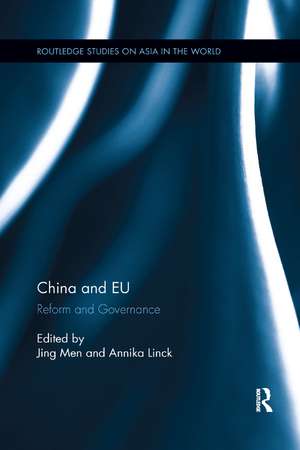China and EU: Reform and Governance: Routledge Studies on Asia in the World
Editat de Jing Men, Annika Lincken Limba Engleză Paperback – 23 ian 2019
The EU, on the other hand, faces the same global challenges with a very different and complex governance system. EU foreign and security policy, thus including EU policy towards China, are governed by the EU’s foreign policy principles, which contain, among others, the promotion of democracy, the rule of law and the universality and indivisibility of human rights and fundamental freedoms. How successful can the EU be in advancing these principles when engaging with China, while respecting the Chinese political system? How can the EU and China find common grounds in their governance systems so as to enhance their strategic partnership in order to tackle global issues that need a coordinated approach?
| Toate formatele și edițiile | Preț | Express |
|---|---|---|
| Paperback (1) | 416.22 lei 6-8 săpt. | |
| Taylor & Francis – 23 ian 2019 | 416.22 lei 6-8 săpt. | |
| Hardback (1) | 997.90 lei 6-8 săpt. | |
| Taylor & Francis – 15 mai 2017 | 997.90 lei 6-8 săpt. |
Din seria Routledge Studies on Asia in the World
-
 Preț: 288.80 lei
Preț: 288.80 lei -
 Preț: 309.89 lei
Preț: 309.89 lei -
 Preț: 325.34 lei
Preț: 325.34 lei - 15%
 Preț: 297.15 lei
Preț: 297.15 lei - 14%
 Preț: 299.52 lei
Preț: 299.52 lei -
 Preț: 389.66 lei
Preț: 389.66 lei - 17%
 Preț: 259.98 lei
Preț: 259.98 lei - 20%
 Preț: 265.74 lei
Preț: 265.74 lei -
 Preț: 389.38 lei
Preț: 389.38 lei -
 Preț: 389.66 lei
Preț: 389.66 lei -
 Preț: 389.66 lei
Preț: 389.66 lei -
 Preț: 382.91 lei
Preț: 382.91 lei - 19%
 Preț: 258.15 lei
Preț: 258.15 lei -
 Preț: 391.65 lei
Preț: 391.65 lei -
 Preț: 310.56 lei
Preț: 310.56 lei -
 Preț: 396.73 lei
Preț: 396.73 lei - 17%
 Preț: 259.98 lei
Preț: 259.98 lei -
 Preț: 390.41 lei
Preț: 390.41 lei -
 Preț: 389.66 lei
Preț: 389.66 lei
Preț: 416.22 lei
Nou
Puncte Express: 624
Preț estimativ în valută:
79.64€ • 83.39$ • 66.06£
79.64€ • 83.39$ • 66.06£
Carte tipărită la comandă
Livrare economică 10-24 aprilie
Preluare comenzi: 021 569.72.76
Specificații
ISBN-13: 9780367141899
ISBN-10: 0367141892
Pagini: 170
Ilustrații: 2
Dimensiuni: 156 x 234 x 9 mm
Greutate: 0.45 kg
Ediția:1
Editura: Taylor & Francis
Colecția Routledge
Seria Routledge Studies on Asia in the World
Locul publicării:Oxford, United Kingdom
ISBN-10: 0367141892
Pagini: 170
Ilustrații: 2
Dimensiuni: 156 x 234 x 9 mm
Greutate: 0.45 kg
Ediția:1
Editura: Taylor & Francis
Colecția Routledge
Seria Routledge Studies on Asia in the World
Locul publicării:Oxford, United Kingdom
Public țintă
Postgraduate and UndergraduateCuprins
Introduction: Reform and Governance in the EU and China
Part 1 - GOVERNANCE AND REFORM IN CHINA
Chapter 1: ‘Soft Legal Transplants’: EU-China Relations at a Glance
Chapter 2: The Role of Local Governance for China’s Political Stability
Chapter 3: ‘Good Governance’ and the Role of Civil Society Organisations in Reform Processes and EU-China Diplomatic Relations
Chapter 4: Bilateral and Domestic Dimensions in China’s Approach to ODI Governance
Part 2 - THE EU AND CHINA IN GLOBAL AND REGIONAL GOVERNANCE
Chapter 5: China and the EU: Partners or Competitors in Shaping Multilateral and Regional Governance in Asia
Chapter 6: The EU and China: Partners in Global Economic Governance Reform?
Chapter 7: The Conundrum of Financial Stability - Central Banks and Currency Management in China, Eurozone and the US?
Chapter 8: Different Models of Engagement in Africa: A Comparison of the EU’s and China’s Development Policy
Part 1 - GOVERNANCE AND REFORM IN CHINA
Chapter 1: ‘Soft Legal Transplants’: EU-China Relations at a Glance
Chapter 2: The Role of Local Governance for China’s Political Stability
Chapter 3: ‘Good Governance’ and the Role of Civil Society Organisations in Reform Processes and EU-China Diplomatic Relations
Chapter 4: Bilateral and Domestic Dimensions in China’s Approach to ODI Governance
Part 2 - THE EU AND CHINA IN GLOBAL AND REGIONAL GOVERNANCE
Chapter 5: China and the EU: Partners or Competitors in Shaping Multilateral and Regional Governance in Asia
Chapter 6: The EU and China: Partners in Global Economic Governance Reform?
Chapter 7: The Conundrum of Financial Stability - Central Banks and Currency Management in China, Eurozone and the US?
Chapter 8: Different Models of Engagement in Africa: A Comparison of the EU’s and China’s Development Policy
Notă biografică
Jing Men is Bailet Latour Chair of EU-China Relations and Director for EU-China Research Centre, IRD, College of Europe, Bruges.
Annika Linck is Research Assistant to the Bailet Latour Chair of EU-China Relations, IRD, College of Europe, Bruges.
Annika Linck is Research Assistant to the Bailet Latour Chair of EU-China Relations, IRD, College of Europe, Bruges.
Descriere
EU foreign and security policy, including EU policy towards China, are governed by the EU’s foreign policy principles, which contain, among others, the promotion of democracy, the rule of law and the universality and indivisibility of human rights and fundamental freedoms. How successful can the EU be in advancing these principles when engaging with China, while respecting the Chinese political system? How can the EU and China find common grounds in their governance systems so as to enhance their strategic partnership in order to tackle global issues that need a coordinated approach?
